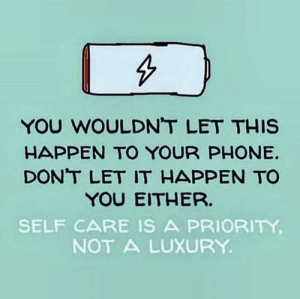Self-Love and the World
If you have been on social media for any length of time over the last few years you’ve probably seen memes or conversations on “self-love” and/or “self-care”. Many of them look something like this…



Sources likes Psychology Today and others define self-love in this way:
Self-love is a state of appreciation for oneself that grows from actions that support our physical, psychological and spiritual growth.
As part of this practice of self-love, self-care is usually described as a means of pampering as you take a break from your normal routines of life, including the pressures of parenting and jobs, to rest and recharge.
Unfortunately, the purpose for both of these trendy, meme-worthy practices comes about due to something far more troubling than the occasional need for a foot rub. Over the last 20 years, we have seen nearly a doubling of antidepressant use in people over 12, while suicides also continue to trend upward in a heart-wrenching trajectory. In our country, with all our money and comforts, so many continue to find nothing but hopelessness. This hopelessness is often connected to a heavy burden brought about by both internal and external expectations of how life is supposed to be.
No doubt, the pressures of social media and the non-stop barrage of “perfect lives” projected on our phones every day feed this insecurity…but that is a subject for another time.
If you think about it, it makes perfect sense that a world that feels this grip of anxiety and self-loathing would see the solution as more self-esteem and self-actualization. After all, who doesn’t love hearing positive things spoken about themselves?
And while the self-esteem movement has it’s limitations there is a deep-seeded truth that we all long to hear profound, positive truth spoken over our lives. Truth that we can anchor our souls into for a lifetime. Truth that transforms how we both see ourselves and also how we see the world.
Where the world gets this wrong is that this truth does not begin with us.
As with anything we view in life, whether movies or memes, we need to filter them through a biblical lens in order to understand what is true. The same is true with the concept of self-love. The idea on it’s face seems completely legit and to speak against it would almost seem blasphemous in our cultural context. But what does the Bible actually say, if anything, about this concept?
Self-love and the Bible
Written into the law of God back in Leviticus, expressed by Jesus in the Gospels, and written to the churches by Paul and James is a very well known scripture that indirectly speaks of the love we have for ourselves.
‘You shall love your neighbor as yourself.’ Matthew 22:39
While speaking on the greatest commandment, Jesus says that we are to love our neighbors in the same way that we love ourselves. This presupposes that each one of us has a strong love and desire for ourselves. While each of us may demonstrate this differently, our minds are constantly consumed with ourselves.
One person’s innate self-love may show itself by a constant desire to be seen with the latest clothes, hairstyle, or tech. On the other hand, another person may show no outward signs of self-love yet their minds are constantly set on themselves as they gaze deeply into the recesses of their being, analyzing everything they do under the microscope of self-awareness.
Where does this kind of self-love propel itself? Consider Paul’s description of the godless in 2 Timothy 3:2-5:
For people will be lovers of self, lovers of money, proud, arrogant, abusive, disobedient to their parents, ungrateful, unholy, heartless, unappeasable, slanderous, without self-control, brutal, not loving good, treacherous, reckless, swollen with conceit, lovers of pleasure rather than lovers of God, having the appearance of godliness, but denying its power. Avoid such people.
Notice the downward spiral that begins with being a lover of self and then engages with all those things that make self feel good but ultimately lead to disaster. This is why the scriptures are filled with admonitions for followers of Jesus to deny self (Matt 16:24) and do nothing from selfish ambition (Phil 2:3).
This biblical glance at self-love is not meant to bypass the diagnosed problems mentioned earlier. Those are very real and very troubling realities. The problem is not with the diagnosis but with the treatment. The treatments of self-love and self-care to combat the depression and exhaustion felt in today’s stress-filled existence only scratch the surface.
There is a deeper well in which we need to draw. A well that holds an eternal love and care for those who would come to it’s healing waters.
A Deep Well of Hope
There is an incredible verse in Galatians 2 that, if fully grasped, could send waves of transformation through the lives of all those who call Christ Lord and find themselves wrestling with the weight of internal and external expectations.
For when I tried to keep the law, it condemned me. So I died to the law—I stopped trying to meet all its requirements—so that I might live for God. My old self has been crucified with Christ. It is no longer I who live, but Christ lives in me. So I live in this earthly body by trusting in the Son of God, who loved me and gave himself for me. Galatians 2:19-20 NLT
There was a cultural expectation in the Jewish community that demanded adherence to certain laws and ceremonial rituals. This burden was being added to the Gospel by certain groups leading to confusion and tension in the church.
It’s into this that Paul declares that “I have stopped trying to meet all [the laws] requirements – so that I might live for God.” Those things were no longer part of His identity. In fact, he goes so far as to say that His identity is no longer in himself but is now fully in Christ who loved him. He can step off the treadmill of spiritual accomplishment and people-pleasing and rest in Jesus because Paul himself (and all believers) is hidden in Christ for all eternity (Col 3:3).
Do you see why this is so transformative?
Self-love says to affirm your identity in yourself by finding good things about you and celebrating them, which is a loop that will eventually run out of power since it’s dependent on broken, weary humans. On the contrary, God’s Word declares that in Christ we have a far more profound identity in the very Son of God who loved us and has given himself for us. His righteousness is ours and all our filthy rags and burdens are no more.
- The burden to meet God’s expectations – overcome because I am in Christ and He has satisfied those expectations perfectly (Heb 7:26-27)
- The burden to meet others expectations – overcome because I am in Christ and He cares for me and is my defender (Matt 10:28-31)
- The burden to meet my own expectations of myself – overcome because God is greater than our hearts condemnations (1 John 3:19-20)
If you are in Christ, this truth is for you. No exceptions.
Jesus suffered and died to destroy the sin that separated you from the Father, even that sin that troubles you in this life. Yes, the very sin you are thinking of now has been nailed to the cross of Christ and is no longer held against you.
Why then do you hold it against yourself?
Redefining Self-Love & Self-Care
Here’s the thing. I believe that the concept of self-love and self-care is a world’s broken way of trying to apply two biblical practices without involving Jesus and His Word in the process.
First, self-love may be a modern term but confession is nothing new to the Christian. I’m not talking about confessing to a priest, but rather the act of confessing truth verbally to yourself or to trusted people.
Consider the psalmist confessing to himself in Psalm 42:
Why are you cast down, O my soul, and why are you in turmoil within me? Hope in God; for I shall again praise him, my salvation Psalm 42:5
In this verse, we see both a confession of weariness and also a confession of truth to combat that same weariness. He did not confess his own positive attributes to liven his spirit, instead he confessed the truth about God and His salvation.
What if, in our despondency, we confessed the truths of Romans 8, Ephesians 1, or Psalm 103. How could anchoring our soul in the depths of eternal truth and the very person of Jesus Christ and His Word transforms us day by day?
Secondly, self-care is not a bad concept but consider the biblical concept of Sabbath rest. Sometimes we all need to break away from the pull of life. Jesus, in His humanity, needed rest and also pulled away from the multitudes to get by Himself. While he was not looking for a spa day, He was prioritizing time with the Father.
Do we trust God enough to turn off the phone, block off the calendar, and rest in His presence?
Abide in me, and I in you. As the branch cannot bear fruit by itself, unless it abides in the vine, neither can you, unless you abide in me. John 15:4
What if, much of our anxiety and exhaustion is happening because we refuse to stop long enough to abide in the One who empowers us for the tasks at hand? What if the care we need doesn’t come from ourselves, but comes from our kind Savior and King who loves us?
Be Kind to Yourself
In closing, I just have to share a song that is part of our family playlist. Written by Andrew Peterson to his daughter, the song is entitled Be Kind to Yourself and entreats the listener to consider themselves in light of God’s love for them.
As someone who has regularly fought the internal battle of self-criticism and felt the weight of my own condemnation fall heavy on my head, I have found this song to be a welcome reminder of a great, eternal truth.
God loves me and I am His in Christ. I pray you find the same comfort I do in that truth.
With that said, I leave you with this song and also with one of my favorite lyrics from it:
You can’t expect to be perfect | It’s a fight you’ve gotta forfeit | You belong to me whatever you do | So lay down your weapon, darling | Take a deep breath and believe that I love you

Mike Crump
Pastor of Church Communications
Mike began ministry in Christian radio, eventually becoming a pastor at a church in North Carolina before moving to Lynchburg to finish his masters at Liberty and join the team at HBC. He is passionate about exalting Christ through any medium available, whether online or in person.

